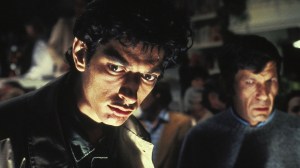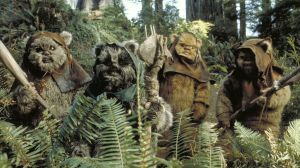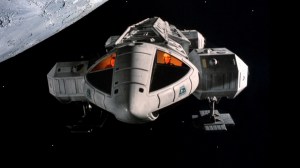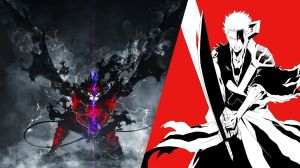It all started with a book. Back in the early 2000s, filmmaker Jeff Nichols came across a copy of Danny Lyon’s The Bikeriders, which featured photos, essays, and interviews exploring the Chicago Outlaws Motorcycle Club in the ’60s. The imagery, personas, and lifestyles compelled Nichols to turn their stories into a feature film, blending together true-life figures and encounters from the book into a fictional narrative that would capture the spirit of a bygone time and place in American history. 20 years later, Nichols finally realized this dream with The Bikeriders, which is now available to buy or rent on digital.
Videos by ComicBook.com
The Bikeriders captures a rebellious time in America when the culture and people were changing. After a chance encounter at a local bar, strong-willed Kathy (Jodie Comer) is inextricably drawn to Benny (Austin Butler), the newest member of Midwestern motorcycle club the Vandals, led by the enigmatic Johnny (Tom Hardy). Much like the country around it, the club begins to evolve, transforming from a gathering place for local outsiders into a dangerous underworld of violence, forcing Benny to choose between Kathy and his loyalty to the club.
ComicBook caught up with Nichols to talk developing the project, biggest challenges, and how he knew he had finally accomplished his longtime goal.
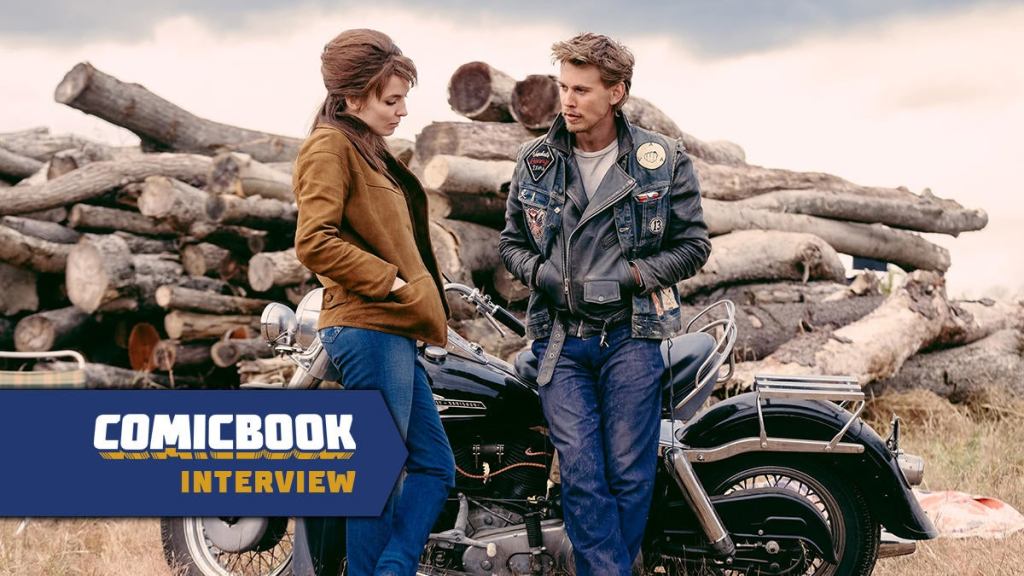
ComicBook: I have to get this out of the way, I can’t let a second go by without expressing how much I love Take Shelter. Anytime I can talk about that movie and recommend it to people, I take every advantage of, so I just wanted to get that out there in case you haven’t heard that today.
Jeff Nichols: Thank you very much. I appreciate that.
Along those lines, Michael Shannon is fantastic in that movie and he’s great in The Bikeriders, as well. How excited was he when he found out that he got to play a Chicago bike rider and actually film in the Midwest?
I’d been talking to him about it for so long. I found this book in 2003. We filmed Shotgun Stories, my first film with Mike, which just was re-released by the way, by Sony Pictures Classics on Blu-ray. We just remastered it, it came out last month. But we shot that film in 2004, so I think I’ve been talking to Mike about this for literally 20 years. At some point, he just didn’t think it was ever going to get made. I had played him the audio, and I was so excited when I first heard the real audio of this man, Zipco, because it sounded like Michael Shannon, when he uses his Chicago accent.
He’s obviously a bit of a chameleon. Even in real life, sometimes, his voice modulates depending on who he’s talking to, and when he’s talking to his friends back home in Chicago, it comes out. It sounded so much like this man, Zipco, and I knew I was going to be giving that character these two monologues, which, really, I think more than maybe any other male character other than maybe Brucie defined the psychology of this club. I know I was very excited about it.
Mike was … I don’t know. He’s always so even-keeled. It is not like he ever called and said, “This is the greatest news ever.” Maybe he just acted like it was inevitable.
I’m glad you both got to finally realize this dream. Since we’ve seen so many movies about bikers that typically center on New York or on West Coast bikers, in your research, what do you think it is about bike clubs in the Midwest or maybe even Chicago specifically that really set them apart from clubs in the rest of the country?
Well, I really just have Danny’s book to go on, but what’s interesting about him, and it’s even baked into the title, and Danny says it in the foreword of one of his books, which is the term “biker” was a West Coast term. It had not really entered the Midwest lexicon in the 1960s. They were bike riders, and that little tidbit alone shows that the Midwest clubs were a few years behind the West Coast guys.
It felt like, in terms of organization, definition, and maybe criminality, the Midwest guys, they just were a few years behind. It helped, I guess, suspend that moment in time where they’re still trying to figure out what they are in any organized way, and that’s really what the movie’s about. That time period is really what the movie’s about, where it’s not like they’re innocent people, but they’re also not organized in terms of their criminality. That was the most interesting thing to me was that they were suspended in time by about three years, it felt like.
When it came to actually fulfilling that dream you had of making this movie, at what point did you feel, “Okay, I’ve done it,”? Was it when you finished the script? Was it when you were actually shooting the movie, when it was finally cut together? Was it engaging in the discourse with audiences? When did you feel like you finally closed that back cover of this project?
Honestly, the biggest sense of that came after production, which doesn’t make sense because the movie’s not done. It’s nowhere close to finished, but I think this production was so, at times, harrowing because we had the guys on the bikes and everything. It was obviously my biggest production in terms of budget, and it was complicated, but I knew, after I left Cincinnati, which is where we shot it, I just knew we had it. I knew we got the movie, because I had just spent two months watching us collect it.
In that way, editing was really fun. I love that Gary U.S. Bonds song that opens the title card of the film with the freeze-frame on Austin’s face. It was in my playlist, but it wasn’t selected as the song to use. I didn’t know what song I was going to use.
When we’re in the editing room, you have the footage, literally the scene is cut together as the scene is cut, and then, we’re just trying out songs and we came to that Gary U.S. Bonds song, it was like, “Oh, well, yeah.” It’s like it had been there forever. That’s just the way it needed to be. Same with the Shangri-La song when they come up over the bridge at night with Kathy on the back of the bike, I had “Out in the Streets” in my playlist, but I didn’t have it for that scene specifically. It just felt like, “Yep, that’s the way it will always be forever.” I felt like when we wrapped, the rest would fall into place. Maybe that was naive, but I just had an extreme sense of confidence that we had done the job, we had collected the images necessary to represent Danny’s book.
Was there a facet about this movie that you felt was the most challenging when it came to taking the vibe, the spirit of this book and translating it to a film without being a direct adaptation? Was it the cinematography to match the book? Was it the characters? Was it the fictional elements that you’re incorporating into this narrative?
Honestly, it’s not a very exciting answer and we can go back and talk about narrative, but the truth is, it was the clothes and the bikes. I knew we’d get the hair right, I knew we’d get the makeup right, but it was the clothes. The clothes, man. Erin Benach, my costume designer who I’ve been with since Midnight Special, she’s so good and she spent so much time aging and dying these clothes. We take it for granted, we just look at it and it’s like, “Oh yeah, they look like bikers.” But the patches, they had all the patches made, all the leather jackets, it was a mix between vintage and new, and then, they aged the new stuff and added grease to everything, dirt. The movie feels very lived in, and I’m very proud of that. And, obviously, that’s the same for production design, but it was really the clothes, and the bikes are an extension of the clothes. The fact that we were committed to putting period-correct bikes in the film, I’m very proud of it. I’m really proud of that fact because they were a bitch.
If you want to talk about narrative, which you don’t necessarily, but the narrative piece that was most challenging was really just trying to figure out the structure. It works for some people more than others, having read some things, but if you pick that book up and you read it and you watch the film, it’s fully realized in the film. It’s not a foregone conclusion that it would be organized the way that it is in terms of the structure of the screenplay. It was an extraordinarily challenging thing to do, and I’m really proud of it. The way that we move through space and time is something I hadn’t done before as a storyteller. Take Shelter, even with its dreamy qualities, is a very linear film, and this is not. And as a storyteller, I think it was a style that I was proud to achieve.
The Bikeriders is now available to buy or rent on digital.
This interview has been edited for length and clarity. You can contact Patrick Cavanaugh directly on Twitter.

